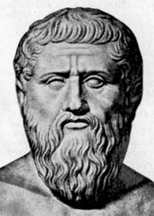Plato avenges Socrates’s death
 Until philosophers are
kings, or the kings and princes of this world have the spirit and power
of philosophy ... cities will never have rest from their evils ... nor
the human race ... and then only will our State ... behold the light of
day. Until philosophers are
kings, or the kings and princes of this world have the spirit and power
of philosophy ... cities will never have rest from their evils ... nor
the human race ... and then only will our State ... behold the light of
day.
-
Plato (c. 427-348 BCE).
Unknown to most of us Plato is actually the nickname of Aristocles.
He was the son of the oldest and most elite Athenian families. Through
his mother’s family he was related to Solon, the celebrated lawgiver.
Even his father’s family had links with ancient kings of Athens. As a
young man he studied music, logic, mathematics and poetry. He made his
mark as a wrestler and served in the army. His name ‘Aristocles’ meant
“best, most renowned.” His nickname “Plato” meant “broad or wide.” In
fact, he had wide shoulders and a wide forehead.
Plato was born two years after the death of Pericles, the architect
of Athenian democracy. Athens was fighting a losing battle against
Sparta. The war continued for more than 20 years. Finally Athens
surrendered to Sparta in 404 BCE. The Spartans with the support of a
group of nobles, known as the Thirty, overthrew democracy and ruled
Athens for eight months.
Plato’s family were members of the Thirty. The great Greek
philosopher Socrates had to pay the supreme penalty for resisting the
Thirty. Young Plato was moved by the turn of events in Athens.
With the restoration of democracy, the elitist classes lost most of
their privileges. The most persuasive speakers controlled the affairs of
the State. The emerging business class created its own power base. Plato
was disturbed by the turn of events. He realised that neither the
aristocracy nor the common people were capable of ruling a country. He
said that the average person lacked wisdom and self-restraint. The trial
and death of Socrates showed him how justice was detached from wisdom
and self-restraint. It was against this backdrop that Plato resolved to
avenge the death of Socrates through philosophy rather than by political
means.
Euclid
|

Plato |
After the execution of Socrates, Plato left Athens and wandered for
nearly 12 years. During that time he studied with the great pioneer of
geometry Euclid and the hedonist Aristippus. He also studied
mathematics, mysticism and Pythagorean philosophy. At 40 Plato founded
his own Academy as a philosophic retreat. The mission of the academy was
to educate people who would be fit to rule Athens. The students were
taught mathematics, geometry, and music to mould their overall
character. After disciplining the mind and soul, students were taught
philosophical principles. Plato lived at the Academy for 40 years,
lecturing without notes, until his death.
It did not take long for Plato to realise that a corrupt State
produces equally corrupt citizens. He identified the structure of an
ideal State based on knowledge and truth. Then he came out with his
Theory of Forms. The Platonic Forms are independently existing, non-spacial
and non-temporal. They cannot be known through the senses. They are also
not ideas. Knowledge is always about Forms. However, his Theory of Forms
still remains a subject of intense philosophical debate.
According to Plato, Forms are universal types that exist outside
space and time. The world contains particular instances of the various
universal Forms. The things Plato refers to as Forms include
geometrical, mathematical and logical relations, virtues and sensible
properties such as beauty and redness.
Democracy
Plato’s philosophy is relevant even today because of his views on the
ideal form of government. Whether it is democracy, autocracy or
plutocracy, people like to be governed by an ideal form of government.
According to him, the ideal form of government is rule by
philosopher-kings, not democracy. This may come as a surprise because
many of us view democracy as the ideal form of government. Although such
a form of government may not be possible in the modern world, by
considering Plato’s views we may get a clear perspective of our own
shortcomings.
Plato says the seeds of democracy are the love of property and riches
and a corresponding desire for a free economy. To preserve their wealth
the rulers encourage trading in real estate and borrow money. According
to him, love of money and self discipline among the citizens cannot
co-exist in any society. This is true of many democratic countries. In a
democratic State many types of people live. They can easily be swayed by
politicians. As a result, any democratic State remains in a state of
constant flux.
Spirit of liberty
In Plato’s view, the chief defect of democracy is “excessive
liberty.” In a prophetic passage in the Republic Plato says, “You would
never believe - unless you had seen it for yourself - how much more
liberty the domestic animals have in a democracy. Love me love my dog,
as the proverb has it, and the same is true of horses and donkeys as
well ... Everything is full of this spirit of liberty.” According to
him, what begins as unlimited freedom ends up as the tyranny over reason
by the lower parts of the soul. It is interesting to note that Plato’s
great pupil Aristotle did not take kindly to the Theory of Forms.
However, he makes his own case following his master’s direction to
produce a well-balanced human being.
For those who ask, “Why study Plato?” S.I. Hayakawa gives a fine
reply. He says, “There seems to be nothing in the study of chemistry
that makes you feel like a superior order of being, but you study Plato
and you begin to believe you’re a philosopher.” |

